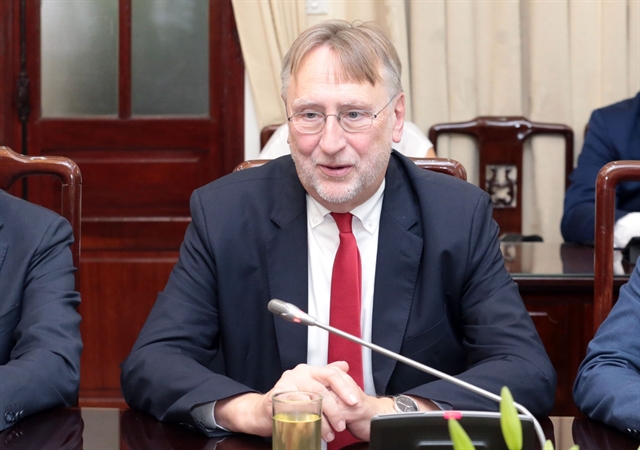The European Parliament is expected to vote for the agreement on January 31, 2020 and the agreement could be ratified in February 2020.

Bilateral trade between Viet Nam and the European Union must guarantee benefits for the people on both sides, the European Parliament’s Committee on International Trade (INTA) Chairman Bernd Lange said on Friday.
“The trade agreement is not only the issue for the governments of both sides but also for the people on the ground,” Lange told reporters at a press conference in Ha Noi.
Each trade agreement had to be comprehensively approached as it was all about fairness and sustainability, he said.
“We should not think it’s only a free trade agreement, we should speak it’s a free, fair and sustainable trade agreement,” Lange said.
He said both sides must seek common understanding on issues which are not clear at the moment.
Those issues are related to sustainability, labour rights and environmental standards, which are integrated parts of the agreement.
Especially, the two sides must work on labour rights and environmental issues, which are stated in content from the International Labour Organisation (ILO) and the Paris Agreement, he added.
The European Parliament (EP) will discuss the agreement, which was signed in June, on November 6. It is expected to vote for the agreement on January 31, 2020 and the agreement could be approved in February 2020.
Lange also pointed out other issues that have remained obstacles for both Viet Nam and the EU such as tangible areas (cars and car parts) and consumer protection.
Speaking highly of Viet Nam’s decision to ratify ILO’s Convention 98 on organised and collective bargaining right, the official hoped the Government and the National Assembly would soon find the way to say “yes” to two other conventions – the Convention 105 on abolition of forced labour and Convention 87 on freedom of association – at the ongoing National Assembly meeting, paving the way for EU members to vote for the European-Viet Nam Free Trade Agreement (EVFTA).
The press conference was organised by the German political organisation Friedrich-Ebert-Stiftung, the Institute for Policy Studies and Media Development and the Centre for Integration and Development. — VNS





